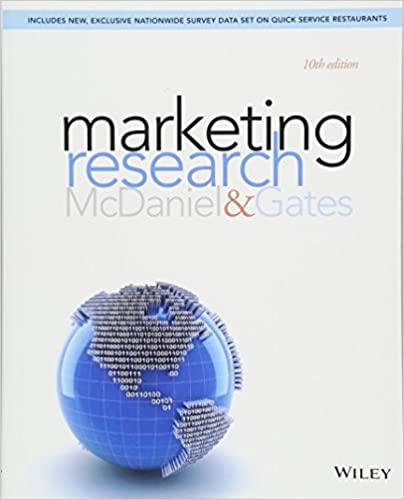For several days Dyquan Gibson and his friends had a strong incentive to study every afternoon at
Question:
For several days Dyquan Gibson and his friends had a strong incentive to study every afternoon at a neighborhood Richmond, Virginia, Boys & Girls Club. “If you finished your homework, you got a burger,” says Dyquan, who is now 11 years old.
Dyquan and his friends didn’t know it, but the free Whoppers came from a consultant hired by Coca-Cola Company. Officials at the Atlanta beverage company had sent the man to Richmond with $9,000. He gave cash to the clubs and other nonprofit groups and told them to treat the children to hundreds of “value meals” at Burger King.
Millions of dollars in sales were at stake for Coke. The company was trying to persuade Burger King to run a national promotion for its slushy dessert drink, Frozen Coke, which Burger King sells at all of its restaurants. But Burger King wanted to run a test promotion before it invested in a big campaign. So the Miami-based restaurant chain ran a two-week test in Richmond, offering a coupon for a free Frozen Coke when customers bought a value meal—a sandwich, fries, and drink combo. If the meals sold well enough, and enough people redeemed the coupons, Burger King would take the promotion national.
The Coke officials embarked on the buying spree because the initial test results were dismal. In the end, their efforts added only 700 value meals to the nearly 100,000 sold during the promotion. But even that small number helped bolster Coke’s case for national push. Burger King sank roughly $10 million into the campaign.
Later, Coke acknowledged that some of its employees “improperly influenced” the sales results in Richmond, and that the actions were “wrong and inconsistent with the values of the Coca-Cola Co.” It issued a public apology to Burger King and agreed to pay the company and its franchisees up to $21 million to make amends.
Questions
1. Were Coke’s attempts to fix the market test unethical? If so, was Coke guilty of unethical behavior, or was it just the fault of some misguided employees?
2. Burger King is Coke’s second largest fountain drink customer after McDonald’s. The Richmond test started out very poorly, and it was clear that unless results improved, the national Frozen Coke promotion was not going to happen. Coke was worried that without the promotion, it would not make its fountain sales objectives for the year. At that point, it was decided to stimulate value-meal sales in Richmond. Did the desired end (meeting sales goals) justify the actions taken? Why or why not?
3. Use the ethics theories described in the chapter to illustrate how Coke decision makers could have reached a different decision.
4. Should Coke fire those responsible, counsel them, or do nothing?
Step by Step Answer:






